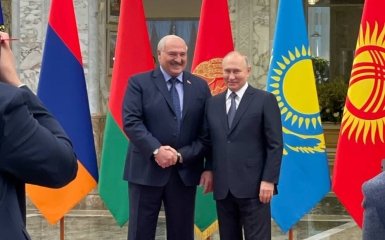Russian dictator Vladimir Putin flew to Minsk, where he met with the self-proclaimed president of Belarus, Alexander Lukashenko.
What is known about Putin's visit to Belarus
According to the Belarusian mass media, Putin flew to Minsk for a Collective Security Treaty Organization session.
They are to discuss "urgent problems of international and regional security" at the meeting.
The day before, the presidents of Tajikistan and Kyrgyzstan, Emomali Rahmon and Sadyr Zhaparov, had already arrived in Minsk. On the evening of November 22, Oleksandr Lukashenko held meetings with them at the Independence Palace.
Thus, all the participants of this year's CSTO Collective Security Council session have already arrived in Minsk. Earlier, it became known that the Prime Minister of Armenia, Nikol Pashinyan, would not be coming to the summit.
By the way, CSTO members are Armenia, Belarus, Kazakhstan, Kyrgyzstan, Russia and Tajikistan.
What Putin said at the G20 summit
It was previously reported that speaking via video link at the G20 summit, the head of the Kremlin could not avoid the topic of the war in Ukraine, which the Russian Federation unleashed. He cynically stated that one should "think about how to stop this tragedy."
Military operations are always a tragedy for specific people, specific families, and the country as a whole. Certainly, we must think about how to stop this tragedy. By the way, Russia has never refused peace talks with Ukraine, Putin issued yet another dose of absurdity.
It is essential to understand that the online meeting of the G20 on November 22 was the first G20 event attended by the dictator Putin since the beginning of the invasion of Ukraine.
It is worth noting that American and Chinese presidents Joe Biden and Xi Jinping were not present at the meeting.
As you know, the head of the Kremlin did not participate in the face-to-face summit of G20 leaders, which took place on September 9-10 in New Delhi.
The aggressor country was represented there by the scandalous head of the Russian Foreign Ministry, Serhiy Lavrov.






